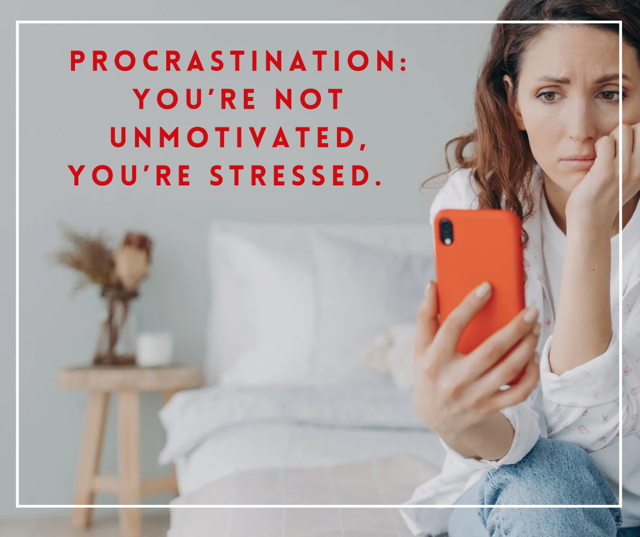
08 May Procrastination: You aren’t unmotivated, you are stressed.
All of us know the feeling that we should do things and that it will give us a sense of achievement and satisfaction of ticking things off our to-do list and yet we do the exact opposite. Procrastination has a bad rap in society, as though it’s a conscious choice to avoid things that need doing, implying laziness, lack of motivation or willpower, or avoiding responsibility. But procrastination is mostly an unconscious physiological response to stress.
The Less Talked About Response to Stress: Freeze
Procrastination, putting off doing things, even things that we want to do, is an example of a nervous system under stress, and we call it the freeze response. The freeze response can also look like panic, zoning out but with reeling or anxious thoughts or increased tension in your body but with a blank mind (eg. exam nerves). It can show up in behaviours like phone scrolling or binge watching series or even just staring out the window or doing everything else apart from the thing that is most urgent or necessary. Imagine the deer caught in headlights – this is the freeze response.
We can go into a freeze rather than the fight or flight response to stress. This means we are experiencing the heightened activity in the body (increased blood pressure and heart rate, more blood rushing to our limbs as if we were needing to run fight or flee and primed muscles, creating tension), and yet the immobilisation response is also present causing the non-movement of procrastination and feeling “stuck”. It’s a bit like accelerating your car and hitting the brakes at the same time.
But I Don’t Feel Stressed…
You might wonder why you are having a stress response when things don’t sound or seem that stressful and other people around you might not have that same response. Well, firstly it doesn’t have to look outwardly that stressful for you to have a physiological stress response, plus a stress response can look different for everybody; some of us might be quietly moody, or some have explosive anger outbursts.
The freeze response can feel and look much less obvious than the fight or flight response to the person experiencing it and to those around them, and the immobility or inaction is a kind of unconscious repression of feeling and response. Remember, it can occur when the more outward expressions of fight or flight are not really available to us or appropriate in that moment. Someone can have a freeze response that looks like just slightly zoning out during a conversation about something that is causing inner stress.
Procrastination in Chronic Illness
Procrastination or freeze response can show up due to overwhelm, burnout, trauma or plain stress. It can tend to show up more in those who have experienced repeated or traumatic stress situations where the fight or flight response wasn’t an option available to us. As people living with illness, think of all the unpleasant and stressful times when you had an inner “No “ but had to let something happen regardless. For example, physical examinations, personal invasive questions, taking medications, medical interventions which felt like your only option but were unwanted and frightening, needing to see various doctors for a diagnosis or treatment and not being listened to or given no solutions. Managing chronic illness can feel unrelenting where self care, tasks and routines have to be done daily without fail in amongst the other stuff of daily life. All of these things can cause a chronic stress response of procrastination and avoidance.
Do you put off going to the doctors or seeking medical attention, taking medications, doing exercise or movement, life or medical admin or other things? These are all examples of the freeze response to stress or overwhelm.
The Freeze Response in Childhood
If we go a little deeper and look at childhood wounds that most of us have in some way, we can also imagine how a freeze response of procrastination could have been created. Let’s imagine that you had a parent that would criticise or shout at you frequently as a child or even hit you. This clash between your need for attachment and closeness with your mother and her abusive behaviour towards you sent you into a fight/flight response internally but you weren’t able to action either of those responses as the need for attachment to your mother was greater for survival. Because these two systems – the attachment system and the defensive system – are at odds with each other, as a child you didn’t know what to do. And so instead, you might go into freeze.
To understand procrastination is not providing an excuse but it is asking for a different solution than trying to force your nervous system to come out of its freeze response by berating yourself or increasing the pressure to DO.
What Can I Do (and Not Do) About It?
Instead what we need is some emotional regulation, which doesn’t have to be “yet another thing to do”, and you will find that motivation and action comes from the emotional regulation, not before it. Regulation can be practiced in tiny and practical ways:
- Notice when you are procrastinating or avoiding and rather than judging yourself, be kind and acknowledge to yourself that your system is feeling stress. You don’t need to identify the “why” at this moment.
- Take a small step to introduce a sense of safety to your system in that moment, like
- orienting to your environment – slowly gaze around at your environment, noticing the mundane objects in your space (providing that you are currently in a safe space), describing at least 3 of them in terms of colour, material and shape (out loud if possible).
- Take you hands to opposite shoulders and stroke slowly down your upper arms to your elbows.
- Take 3 soft full breaths, sighing as you exhale.
- Identify 3 small micro tasks that you could or need to do and choose the easiest one and do it. If this feels not possible in this moment, go back to step 1 and 2 focusing on regulation and self-compassion.




Sorry, the comment form is closed at this time.